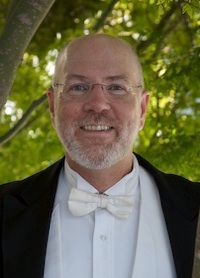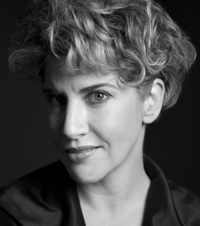Accomplished singers, lively program in Berkeley
The Sanford Dole Ensemble, created out of a vocal tradition to explore contemporary music for voices and instruments, opened their new season with a chamber concert Sunday, October 17, the first in what they hope to be an annual tradition. The four singers, violin and piano were neatly matched by the intimate space of St John’s Presbyterian Church in Berkeley.
 That church was particularly meaningful, Sanford Dole remarked, as he grew up attending services there. In a departure from the large choral events of the last several years, he hoped to explore works written for solo voice or small group as well. “Our foray into choral chamber music gives us an opportunity to be more dramatic.”
That church was particularly meaningful, Sanford Dole remarked, as he grew up attending services there. In a departure from the large choral events of the last several years, he hoped to explore works written for solo voice or small group as well. “Our foray into choral chamber music gives us an opportunity to be more dramatic.”
Along with drama this concert held lightness. While several of the works were serious, and even included modern prayers, others were delightfully droll. Musically, they ran the gamut from “serial modal” to jazz chords to a comical accompaniment to a silly Thurber tale. That last one was the most difficult, with split-second timing and careful harmonies. I am always impressed by the demands of great comedy, and just as timing can make or break a good pratfall, so the difficult vocal entrances and mock-serious piano interludes of Ken Malucelli’s The Unicorn in the Garden made it a resounding success, one that—like a great clown—was always a step away from disaster.
Reducing a chorus to its minimum, four singers accomplish the four vocal types. Soprano Heidi Moss, alto Heidi Waterman, tenor Mark Mueller and baritone Joshua Henderson opened the concert with Ode to Music, Paul Ayres setting of an opaque Swinburne poem. The antique lyrics were elaborated with polyphonic entrances, a complexity that well suited Swinburne’s musings on music as companion to light. Keisuke Nakagoshi, a member of the Adorno Ensemble and a coach at the SF Conservatory, accompanied on piano with terse phrases against the ornate text.
Frank Ferko wrote Cyclamen to a poem by David Brendan Hopes, and while the poem is modern, it held fin de siècle decadence reminiscent of French late nineteenth century Romanticism. Nakagoshi used Messiaen-like chords—thick centers, high and distant-sounding clusters. Violinist Hrabba Atladottir, a member of the Left Coast Chamber Ensemble and a roving regular at Bay Area orchestras, took a low meditative line. Henderson sang the long poem in a resinous baritone, with chromatic and modal phrases that added to the sense of honeyed death. Atladottir repeated his phrases before wandering into high and eerie realms, with the piano trickling across.
This compelling piece was followed by another work, powerful in its fragmentary form. Heidi Moss sang four Civil War letters, written by women and set by composer Daron Hagen. The lonely “Christmas Night” was plaintive and wandered up whole tone scales. “The Trouble was Tom” held a brief levity set to fast broken rhythms. In the a capella “The Lord Knows…” Moss was soulful and disturbing, and they finished the set with a lilting and gentle “O for Such a Dream.”
Rounding out the diverse music, Warner Jepson paired with librettist Dennis Dunn for three songs from their musical, Lord of the Single Lizard. Warm and full of jazz chords, “Love Comes, Love Goes” was pure Broadway, a song of regret with gentle pairs of descending piano chords. This was a great showcase for alto Heidi Waterman, who projected warmth like the kiss of sun on closed eyes.
“House and Garden” was the darkest, a poem of stunted life in an alley or junkyard. That sardonic text was at odds with the upbeat vocals and cool 7 chords, something one might expect from Manhattan Transfer.
Completing the program, Dole brought his own works, with three settings of the religious poetry of Thomas H. Troeger. Likening the Creator to Anansi or Clotho, Dole’s scales climb curiously and twist back down, never resolving, a musical metaphor for the weaving of the world.
 Lastly tenor Mueller showed his stuff in “Cisco’s Aria” from Dole’s opera-in-progress on the Cisco Kid. Sung with a touch of whiskey against piano waltz, the text was visceral and brusque: “Her hair is silky, just like my gun. And glints in the sun.”
Lastly tenor Mueller showed his stuff in “Cisco’s Aria” from Dole’s opera-in-progress on the Cisco Kid. Sung with a touch of whiskey against piano waltz, the text was visceral and brusque: “Her hair is silky, just like my gun. And glints in the sun.”
Fun!
The full Ensemble continues their season with Paul Ayres’ Messyah in December, and a concert of all new works in February. More information is available at www.sde.org.
—Adam Broner
Photo top: Sanford Dole; bottom: Heidi Moss is one of the four soloists, photo by Matthew Washburn. This article previously published in the Piedmont Post.
